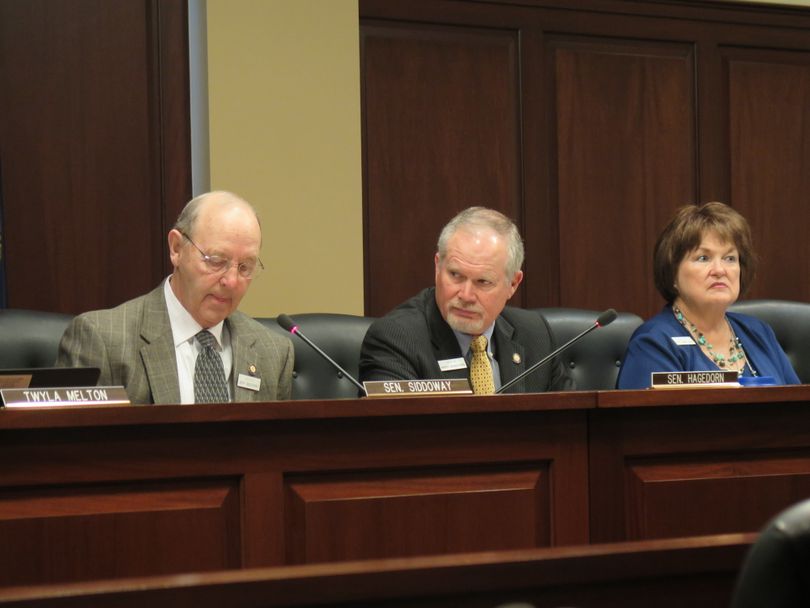Senators refuse to introduce bill to reverse special legislative pension perk

Sen. Marv Hagedorn, R-Meridian, unsuccessfully proposed legislation in the Senate State Affairs Committee this morning to repeal a 1990 law that allows longtime state legislators who, late in their careers, are appointed to high-paying full-time state positions to count their years of legislative service as full-time, thereby ballooning their retirement pensions. “This basically sets the calculations to reflect our part-time status as it is today in that calculation for retirement,” Hagedorn told the committee. “And this would be effective Dec. 1, 2018 for new legislative members that start their careers, or those of us who get re-elected to come back.”
Sen. Chuck Winder, R-Boise, asked how the change would affect those who, like him, served many years in other part-time positions, in his case at the Ada County Highway District and as chairman of the Idaho Transportation Board. Hagedorn said, “That is addressed in the bill, and we will gladly talk about that should we print the bill” and hold a hearing.
However, no member of the Senate State Affairs Committee made a motion with regard to Hagedorn’s proposed bill. Committee Chairman Jeff Siddoway, R-Terreton, said, “It looks like the bill will be held in committee because of lack of a motion.”
Later in the meeting, Hagedorn moved for reconsideration. He noted that the Citizens Commission on Legislative Compensation has submitted a request to the Legislature to revisit the issue. Hagedorn’s motion to reconsider, seconded by Sen. Patti Anne Lodge, R-Huston, passed on a 6-3 vote, with just Sens. Davis, Winder and Lakey opposing it. But then, his motion to introduce his bill failed, 5-4.
The House passed legislation in 2015, HB 100, to do away with the perk. After the successful House vote, it was reconsidered and passed again. But the bill died without a Senate committee hearing.
In June, two Idaho citizens, a retired math teacher and a CPA, urged the Citizens Commission on Legislative Compensation to weigh in on the issue, and the panel did, for the first time urging lawmakers to revisit the issue. But lawmakers have taken no action, despite repeated contacts from the two citizens, brothers Jim and Tom Haddock.
In 2015, some GOP leaders in the House said they thought HB 100 was unconstitutional, because lawmakers aren’t supposed to set their own compensation; that’s done by the citizens commission. That prompted the brothers to go to the citizens commission. The commission was created by a constitutional amendment in 1976.
Here’s an example of how the current law works: When longtime state lawmaker and former House Speaker Lawerence Denney was elected Secretary of State, his state pension as a legislator was worth roughly $500 a month. If he serves out one four-year term in the higher-paying elected position, his pension will be roughly $3,600 a month, for life. That’s because the 1990 provision treats years of legislative service the same as full-time state employment for purposes of pension calculations.That’s not true for any other part-time elected official.
Here’s how senators on the committee split in the 5-4 vote against introducing the bill:
In favor: Sens. Hagedorn, Lodge, Rohn (sub for Buckner-Webb), and Siddoway.
Against: Sens. Davis, Hill, Winder, Lakey and Stennett.
After the meeting, Senate Majority Leader Bart Davis, R-Idaho Falls, said, “I just didn’t think that the bill is going to be advanced, either out of this committee or certainly out of the House.” He said he thought there were constitutional issues. “I also don’t think it’s good public policy to do this,” he said.
Hagedorn said, “I’m disappointed. We’ve had a problem for a long time of treating legislators differently from the rest of state workers, and I don’t think that it’s appropriate. I think the concerns of those who voted against it are likely constitutional concerns. But we screwed this up in 1990, so it’s up to us to fix it. And when we have our compensation commission requesting us to fix it and we refuse, the problem will continue to exist.” He added, “We will keep at it.”
